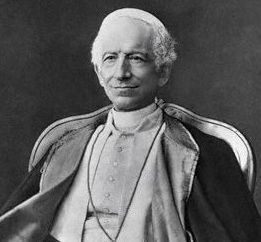Reading Francis Through Leo XIII?
Pope Francis gave another interview and already everyone is screaming. Other people have written about various aspects of it, but there’s one thing in particular I found interesting that I would like to talk about. This is the following statement everyone seems to be freaking out about:
The most serious of the evils that afflict the world these days are youth unemployment and the loneliness of the old. The old need care and companionship; the young need work and hope but have neither one nor the other, and the problem is they don’t even look for them any more. They have been crushed by the present. You tell me: can you live crashed under the weight of the present? Without a memory of the past and without the desire to look ahead to the future by building something, a future, a family? Can you go on like this? This, to me, is the most urgent problem that the Church is facing.
Your Holiness, I say, it is a largely a political and economic problem for states, governments, political parties, trade unions.
“Yes, you are right, but it also concerns the Church, in fact, particularly the Church because this situation does not hurt only bodies but also souls. The Church must feel responsible for both souls and bodies.”
Everyone seems to be focusing a lot on the bolded part, and, par for the course, ignoring everything else quoted. He says that at this moment, the biggest danger is not just unemployment and loneliness, but rather what they signify. What good is a society if they can’t take care of their elderly, and also cannot provide any hope for the future? Everyone is stuck in the tyranny of the present, which is a very nasty and brutish tyranny. When Peter gave the Gospel, he didn’t call for people to save themselves from events that already happened or from the world to come, but to save ourselves “from this wicked and perverse generation.” (Acts 2:40) The world hasn’t changed much in 2,000 years.
The Global Financial Collapse of 2008 changed a lot of what we know about the world. Unemployment has become nearly permanent for the youth, and across the globe the elderly have mostly been abandoned by their families. (Or worse yet, euthanasia.) The young and the elderly realize this. My generation isn’t optimistic about the future; they are downright dystopian about it. For many of them, they feel there is no hope to advance in life. As many governments have enacted austerity in the wake of the crisis, the elderly have frequently been a casualty, as their personhood is reduced to numbers in an actuarial table. If you happen to be elderly and poor, well good luck.
In such a situation, it is next to impossible for the Gospel to take root. People won’t look to an eternal home when they don’t have much a chance of surviving in the present. Many will say this isn’t the Churches business, as these are primarily political and economic concerns, not those of the Church which are spiritual. Francis rightly rejects this line of thought, insisting that the damage unleashed by these forces impacts not just bodies and political states, but first and foremost it impacts souls. In these words, one finds an echo of Leo XIII in that most splendid of papal encyclicals, Rerum Novarum. In that encyclical, Leo condemns the idea that “it be supposed that the solicitude of the Church is so preoccupied with the spiritual concerns of her children as to neglect their temporal and earthly interests. “ (RN 28.)
Leo spends paragraphs 27-42 talking about how the Church has dealt with this problem throughout history, and offered suggestions for how nation states could do the same. The State has been trying to find a better broker on these issues than the Church for the past few centuries, and she still hasn’t found one. Communism and materialism haven’t fixed these problems; they’ve only made them worse.
Here’s the depressing part, and something I don’t think Catholics have really come to terms with. One of the reasons the Church was able to be such a balance was because she had extensive networks built up throughout society to help the poor, restrain the avarice of the rich, and act as a leveling power to bring the two together. Almost all of those institutions are gone due to the Crisis in the Church of the last five decades. Nobody can afford them anymore. Even in the Church rich and poor are becoming increasingly segregated, mirroring secular culture.
In other manners of social assistance, even most Catholics are free to let the welfare state help the poor instead of their own networks. Here in America, the last bastions of those old networks (Catholic Hospitals) are now faced with closing their doors unless they violate their religious beliefs. As these institutions have disappeared, so has the Churches moral voice in society. Without that voice, the state has only been too happy to substitute its own wisdom, and the results aren’t pretty. Is it any wonder that such a nasty and brutish society has abortion as its primary sacrament? Is it any wonder that in such a society, the primary target of the world is the nuclear family, the only institution that can begin to fix this mess?
I don’t know if this is the Pope’s message or not. I also am not going to say I am optimistic about what can be accomplished by this Pope. Even a fantastic pope is only going to make a small dent in this problem. Leo XIII could be credibly called one of those, and the problem he saw coming in the 1890’s came anyways. I do think Francis has a keener understanding of society’s problems than many are giving him credit for, and perhaps we should pay attention.


